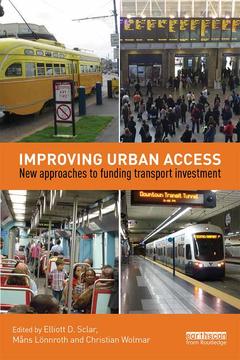Improving Urban Access New Approaches to Funding Transport Investment

By 2050, two-thirds of the world?s population will live in cities. To thrive, they will need efficient and sustainable forms of transport, but to achieve this, the financial incentives guiding urban transport operation must change ? and change rapidly.
Urban transport plays a critical role in determining the social, environmental and economic shape of cities. Improving Urban Access: New Approaches to Funding Transport Investment provide innovative ideas on how we might reorganize transport finance to ensure that it is suited to serving the social, environmental and economic principles that must guide future urban living. Continuing the work begun by its predecessor, Urban Access for the 21st Century, the authors assess the complexity of implementing new finance approaches and suggest ways to make positive and radical changes. Although the range of revenue raising options remain limited to users, indirect beneficiaries, and the general public, these can be recast to transform the way transport is paid for and therefore how its services are delivered.
New finance models only succeed when they are intrinsically linked to the economic, social, cultural and political forces that create urban life. Together these volumes provide a starting point for the deeper research and policy design needed to successfully create urban transport finance systems that can address the challenges that 21st century cities present.
1. Sustainability and Social Inclusion: The complexity of financing urban access –Elliott Sclar and Måns Lönnroth 2. A Field Guide to the Challenge of Financing Urban Access –Elliott Sclar and Måns Lönnroth 3. Shaping Rapidly Growing Chinese Cities: Lessons in the behavioural impacts of transport finance choices –Jinhua Zhao & David Block-Schachter 4. The Social Meaning of "Access"; Lessons in transport governance from cities in developed counties –Jago Dodson, Matthew Burke, Neil Sipe and Anthony Perl 5. Mobility and Access when Formal Markets Do Not Exist: Lessons from cities in developing countries –Julien Allaire, Pablo Salazar Ferro, Bernard Abeiku Arthur, and Jean-Claude Ziv 6. Lessons from Economics: Mechanisms for financing mobility –Kenneth Gwilliam 7. Value Capture: Why we may be disappointed –Lauren Fischer and Elliott Sclar 8. Why Can’t Urban Transport Behave Like Other Public Services? Explorations in public utility regulation –Andrea Rizvi 9. Measuring Access not Mobility: A technical challenge –Elliott Sclar and Måns Lönnroth 10. Practical Approaches to Measuring Access and Social Inclusion: Lessons from Lisbon –José Viegas, and Luís Martínez 11. Access and Social Complexity: Identifying and managing access requirements across social groups and across the world –Antonio Páez 12. What is Past is Prologue: Stepping into the future –Elliott Sclar and Måns Lönnroth
Elliott D. Sclar is professor of urban planning at Columbia University, USA, where he directs the Center for Sustainable Urban Development (CSUD) at the Earth Institute. CSUD is a VREF Center of Excellence in Future Urban Transport. An economist, Sclar studies the financial dynamics of public services, especially public transport. His book You Don’t Always Get What You Pay For: The economics of privatization won two major academic prizes. He co-authored Access for All: Transportation and urban growth with K. H. Schaeffer.
Måns Lönnroth, trained in applied mathematics with a graduate degree from KTH Royal Institute of Technology, Sweden, is interested in the meetings between politics, policy, and science. He has been a board member of the VREF and also managing director of Mistra, a Swedish endowed foundation for strategic environmental research, as well as international vice chairman of the China Council for International Cooperation on Environment and Development. He has been a political advisor at the Swedish Prime Minister’s Office between 1985 and 1991, co-organizing the Swedish government’s commission on HIV/AIDS, and was a state secretary at the Swedish ministry of environment between 1994 and 1999.
Christian Wolmar is an author and journalist based in London, UK, specializing in transport. He is a frequent speaker at conferences both in Britain and abroad, and has written a series of books on railway history, including The Subterranean Railway (the London Underground), Fire and Steam (railways in Britain), Blood, Iron and Gold (the influence of railways across the world) and To the Edge of the World (the history of the Transsiberian railway).
Date de parution : 04-2016
15.6x23.4 cm
Date de parution : 04-2016
15.6x23.4 cm
Mots-clés :
transport; systems; public; accessibility; indicator; user; fees; impact; congestion; charges; Mapped Activity Locations; HOV Lane; Completion Risk; Tamil Nadu; International Monetary Fund; Urban Access; Urban Transport; Functional Mix; Fare Box Revenue; Common Language; Increasing Mode Share; Accessibility Planning; Accessibility Indicators; Impact Fees; Urban Transport Systems; TIF; Paratransit Services; Capture Schemes; Distance Decay Function; LMA; Public Utility Model; Paratransit Operators; Attraction Decay; Urban Transport Sector; Central Government



